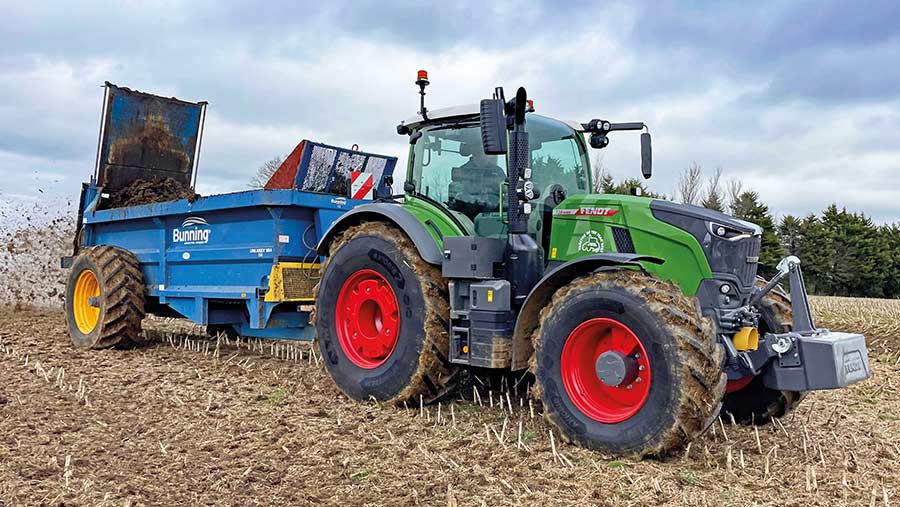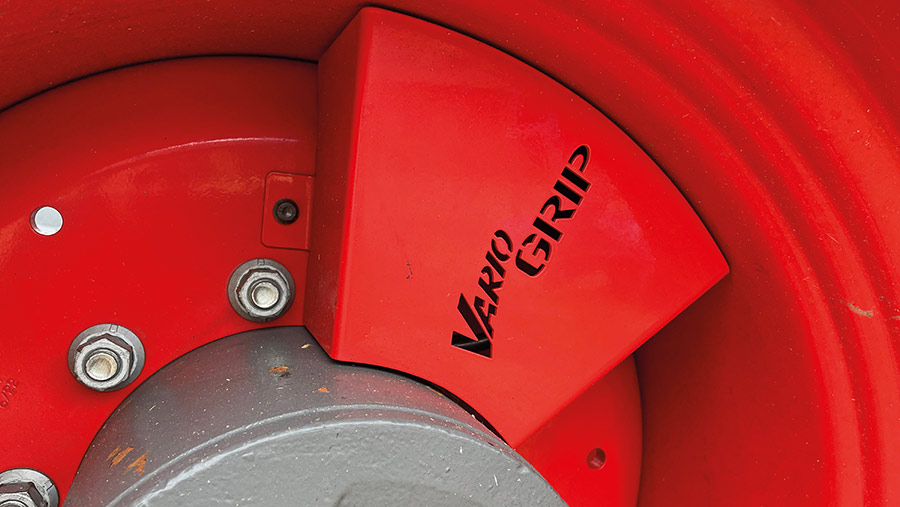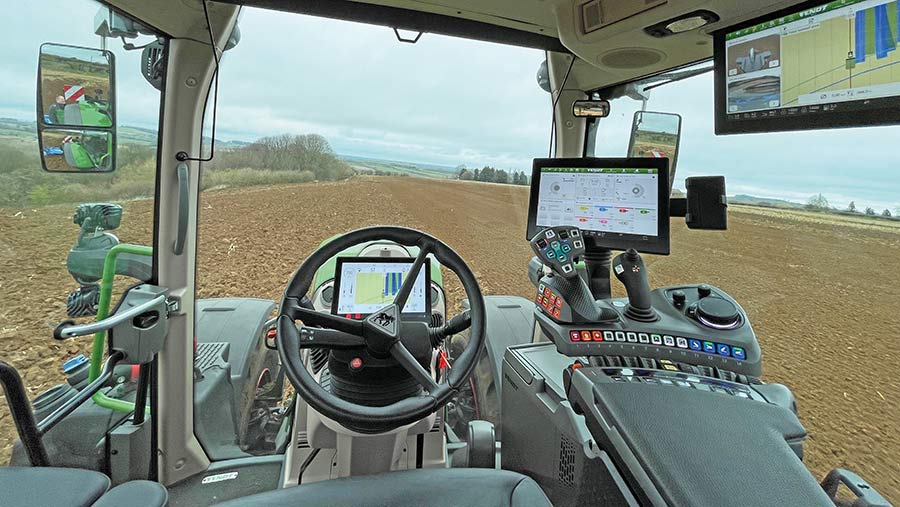First impressions: New £250,000 Fendt 728 lands on UK soil
 © James Andrews
© James Andrews What do you do when you’ve nailed the formula for a compact 240hp tractor that accounts for about half your annual sales? If you’re Fendt, you decide to change it.
Yes, after more than a decade as the go-to tool for upwardly mobile farmers and contractors, the 724 Vario has been treated to a major overhaul.
Gone is the 6.1-litre Deutz engine, replaced with a beefy 7.5-litre block from in-house brand Agco Power.
See also: On test: John Deere’s 6R 185 tractor
And, in place of the original two-range Vario transmission sits a new single-range Variodrive unit with variable automatic four-wheel drive.
Fendt’s quest to deliver more power, torque and payload has also seen the tractor’s dainty frame abandoned in favour of a longer, heavier-duty chassis.
The extent of these changes has led to a significant shake-up of the 700-series hierarchy, with the 724 demoted to mid-range status and two higher-horsepower models, the 726 and 728, being drafted in above.
Range reshuffle
Fendt’s reshuffle of the biggest 700 series tractors will have a knock-on effect on the models that sit either side of it.
Currently, just the 720 to 728 have been given the new chassis, engine and transmission, meaning the smaller 714, 716 and 718 remain on the same platform.
To add yet more confusion, order books are still open for the full Gen-6 range, making it possible to get some models, such as the 724, in either Gen-6 or Gen-7 guise.
Fendt hasn’t confirmed exactly what will happen next, but it’s fair to assume that the smaller 700-series tractors won’t be given the new larger platform.
So, perhaps this will make room for a new 600 six-cylinder range that will run from 160hp to just over 200hp.
As for the 800s, these are the only models yet to receive the FendtOne cab update, which signals that they should be due a major overhaul.
The new 700s have now encroached well into their territory, but these new tractors don’t quite have the stature to replace them like for like.
We can only assume that the 800-series will get bigger to bridge the gap to the 900-series more effectively.
If there is any news, it’s likely to come around the time of the Agritechnica show in November.
The latter looks like a good match for bigger-boned rivals such as John Deere’s 6R 250, but it creates some significant blurring of the lines between it and the king of the 800 series – the 828.
To find out if this upscaling is a welcome upgrade, or a dilution of the 724’s winning formula, we got a drive in one of the first 728s to enter the UK.
This came in the fully loaded Profi Plus spec with most boxes ticked on the options list.
Engine upgrade
It might now wear an Agco Power badge, but the engine slotted in the Fendt 728 will still be thought of by many as a Sisu.
That’s no bad thing, as these power plants have a reputation for offering plenty of no-fuss power and torque, as well as excellent reliability.
However, it is worth noting that this is a brand-new 7.5-litre engine that’s been built specifically for the Gen-7 700s, not to be confused with the 7.4-litre engine used by Agco stablemates Massey Ferguson and Valtra.
Benefits include the ability to deliver high torque at low rpm, which helps reduce fuel consumption and make the tractor quieter.
On the road, this means 50kph is achieved at a sedate 1,200rpm, with the new option of 60kph reached at 1,450rpm.
It’s the same story in the field, with just 1,650rpm required to spin the 1,000-speed pto, which is about 250rpm lower than the Gen-6 724.
The Gen7 700 Vario range |
|||||
|
|
720 |
722 |
724 |
726 |
728 |
|
Engine |
Six-cylinder, 7.5-litre Agco Power |
||||
|
Max power |
203hp |
223hp |
243hp |
262hp |
283hp/303hp (boosted) |
|
Max torque @ 1,300rpm |
1,090Nm |
1,150Nm |
1,220Nm |
1,318Nm |
1,450Nm |
|
Transmission |
Variodrive TA190 |
||||
|
Top speed |
50kph |
60kph |
|||
|
Hydraulics |
165 litres/min or 220 litres/min (optional) |
||||
|
Lift capacity front and rear |
5,300kg and 11,050kg |
||||
As the flagship model, the 728 gets the benefit of the firm’s “dynamic power” boost function, which gives it an extra 20hp to play with.
Unusually, this is available at all times, rather than being limited to when the tractor is travelling over a certain speed or the pto is in gear.
As a result, it’s almost fair to claim that it’s a 303hp tractor.
Another notable feature is the pressurised hydraulic cooling fan, which is similar to that used in the 1000-series.
Fendt says it takes 40% less power to drive than the old viscous arrangement and it seems quieter, too.
No range change
When it made its first appearance on the 1000-series back in 2014, it was inevitable that Fendt’s Variodrive transmission would filter down to smaller models.
The TA190 version fitted in the 700-series works on the same principles as its larger sibling, with independent drive to the front and rear axles via two separate hydraulic motors.
One of the most obvious improvements is that there is no longer a range change to perform when moving from field to road work.
But there are also some benefits to the sophisticated variable four-wheel drive system.
Cleverly, this balances power and torque between the front and rear axles to maximise grip, as well as offering a pull-in turn function that claws the front axle round to give a tighter turning circle.
It means the new Gen-7 tractors have a turning circle of 11.8m on 600/70/R30 tyres, which is tighter than the Gen-6s.
Bigger booties
For some, the updates to the 700s’ wheel and tyre offering will be welcomed with open arms.
For the first time, there’s the option of adding Variogrip central tyre inflation, which is a bonus for those that need to regularly flit between sensitive soils and tarmac.
Previously, buyers wanting this had no choice but to upgrade to the 800-series.

© James Andrews
Bigger rims and tyres are also available up to 710/70 R42s at the rear – giving an overall diameter of 2.05m – and 600/70 R30s on the front.
As a comparison, the biggest the Gen-6 724 could accommodate were lower profile 42in tyres with a diameter of 1.95m.
Cab refinement
Save for a few minor tweaks, the cab and controls are the same as the Gen-6 700-series.
Minor upgrades include the option of fitting a coolbox/hot box next to the right door, an ultra-fancy heated, cooled and massaging seat from premium brand Isri, and the option of integrated front grille and rear cameras that feed into the in-cab displays.

© James Andrews
As we’ve said before, the level of technology and customisation on offer is mind-boggling and most users will only ever scratch the surface of what it can offer.
Verdict
As the top-dog in the Agco stable, Fendt has to come up with a premium product that stands out from the crowd.
The old 700-series achieved that for years, but with other brands able to use its transmission and their levels of technology rising to similar levels, it was time for the Marktoberdorf engineers to reassert their authority.
Fitting a bigger, low-revving engine seems like a winning move, particularly with its reputation for reliability.
And the sophisticated transmission is a nice upgrade, removing the need to change ranges and cleverly working to get the most from the engine.
The flipside is that the tractor has lost its compact proportions, which might make it too clumsy for some of the lower-key jobs a Gen-6 724 could happily turn its hand to.
But the biggest problem is the price. On farm, a 728 is likely to command a figure of about £240,000-£260,000, which is a staggering sum to shell out for a tractor of that size.
We hear that Fendt’s order books are still brimming, meaning there’s little incentive for price cutting.
However, if sales start to tail off, or the firm opens up more factory capacity, perhaps there’s a chance they’ll drop to more sensible levels.
